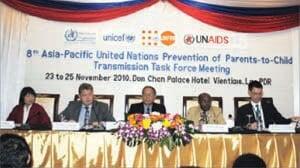Vientiane, Lao PDR, 26 November 2010 - Asia Pacific governments and UN officials have agreed to accelerated efforts towards eliminating the transmission of HIV from mothers to their newborn children at a meeting in the People's Democratic Republic of Laos.
This week's 8th meeting of the Asia-Pacific Prevention of Parents-to-Child-Transmission (PPTCT) Task Force in Vientiane was an opportunity to highlight the encouraging progress that has been made around the region to reduce the number of babies becoming infected with HIV through mother-to-child transmission.
In India, authorities are moving towards universal antenatal testing while China is expanding the package of routine services for expectant mothers to include HIV, syphilis and Hepatitis B. Health investments by Thailand and Malaysia have helped push mother-to-child transmission of HIV to its lowest recorded levels, while in Laos, maternal and child health (MCH) services have been successfully linked with HIV to improve PPTCT and anti-natal care coverage.
Based on such successes, delegates agreed to set themselves a more ambitious target: the elimination of HIV among children and congenital syphilis from Asia and the Pacific by 2015.
"No child should be born with HIV and elimination of parent to child transmission is possible," said Steve Kraus, Regional Director for UNAIDS. "We are seeing encouraging signs of progress in the Asia-Pacific region, but coverage rates are currently still below what is needed, particularly in certain parts of the region where pre- and post-pregnancy care coverage is low."
Delegates agreed that more extensive political backing and financial resources will be essential if the new target is to be achieved. Other challenges were also acknowledged.
"There are new efficacious technologies to take parent to child transmission of HIV from prevention phase into elimination," said Dr Massimo Ghidinelli, Team Leader, HIV/AIDS and STI, WHO - Regional Office for the Western Pacific. "However, elimination will only be possible if there is a strong collaboration between HIV, Sexual Reproductive Health and Maternal and Child Health programmes".
For her part, UNICEF Regional HIV and AIDS Adviser, Dr Wing-Sie Cheng, pointed out that unless health systems and data management were substantially upgraded, a key target population risked being overlooked. "We need to put our resources, energy, and collective weight towards finding the children, women and men, the marginalized and vulnerable populations who are currently lost to PPTCT, MCH and HIV services," said Dr Cheng.
Nobuko Horibe, Regional Director of UNFPA said health systems would be strengthened by improved linkages and synergies between HIV and reproductive health/MCH. "We need to make sure that in the wider public health perspective the issues of primary prevention of HIV infection in father, mother and babies and family planning for women living with HIV are properly addressed."
A series of immediate steps are to be taken following the meeting. The draft regional conceptual framework will be finalized, including a focus on issues of stigma and discrimination, gender equity, and the involvement of men in tackling PPTCT. Country fact sheets will be developed as advocacy and resource mobilization tools. The Regional Task Force will be strengthened and will intensify support for operational research to tackle bottlenecks and improve the quality and coverage of services.


